- Home
- Living Gluten Free
- Gluten-Free Skin Care
Do You Need Gluten Free Skin Care? Myths, Science and Practical Advice
The initial panic is over. You’ve gotten the gluten out of your diet. You’re standing in front of the mirror one fine morning looking at the bottle of cleanser in your hand, feeling pretty good about yourself and the thought strikes…”what about gluten-free skin care? Should I be worried about what goes on my skin? I’ve had some skin problems in the past, could that be caused by…oh man…
On This Page You'll Find
4 Big Questions Answered
4 Simple Recommendations for Healthier Skin and Better Balance
4 Key Facts to Make Your Skin Care Decisions Easy
Plus:
-Resources to find products that work for you
-Naturally Gluten-Free skin care on the market or right in your own pantry
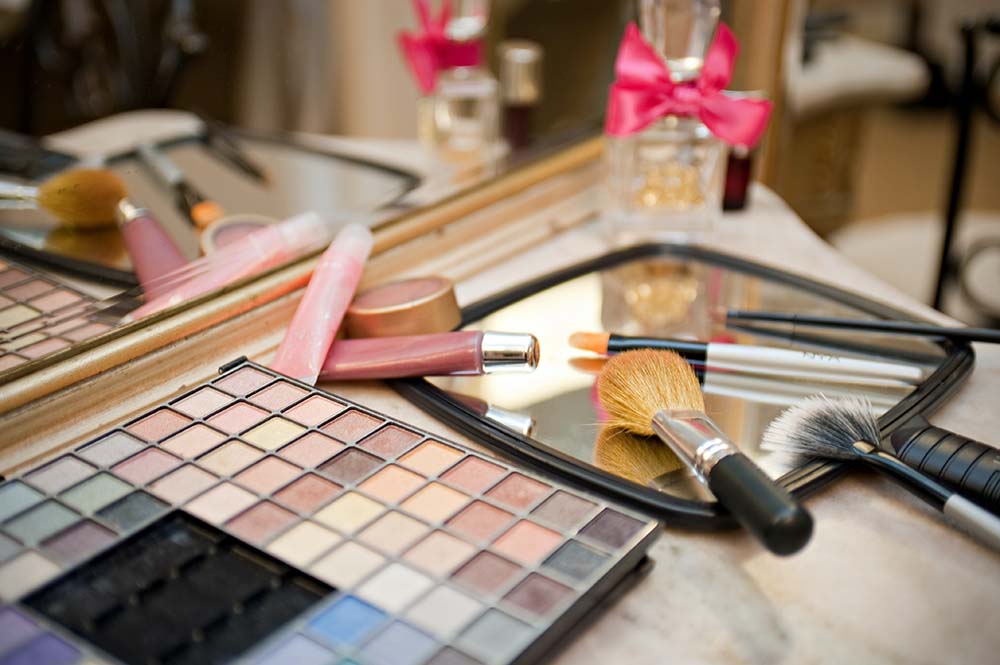 Photo by Jamie Coupaud on Unsplash
Photo by Jamie Coupaud on UnsplashRead through, or use the links below to jump to the sections that interest you.
Gluten-Free Skin Care - The 4 Big Questions
How gluten affects your skin, and whether you should be sticking with gluten-free skin care products is a pretty controversial topic, and we don't have 100% agreement from the experts. So let’s explore the most common questions and draw our own conclusions together.
1. Can Gluten Be Absorbed Through the Skin?
|
Gluten is a protein, and the protein molecule is too large in fact to be
absorbed into the skin. In order to
cause a gluten reaction, the gluten molecule has to enter your body and make its
way to your small intestine which is where gluten causes all of its havoc.1 Answer: No, gluten is not absorbed through the skin. 2. Can Gluten In Skin Care Products Cause Celiac Symptoms?Since celiac symptoms like intestinal discomfort, joint aches, headache, nutritional deficiencies and all the symptoms they bring are caused by inflammation in the gut, the answer to this is really contained in question 1 The gluten molecule is not absorbed through the skin. If you don't eat gluten it can't get to your intestine to cause any celiac related symptoms. Answer: No, applying gluten to your skin will not cause celiac related symptoms. |
Pin For Later |
3. Can Gluten In Skin Care Products Cause Breakouts?

Many people with celiac disease and gluten intolerance do report skin breakouts when they apply products that contain gluten. What could this be about? According to the best scientific information available, gluten applied to the skin will not cause a celiac related breakout. If you have a reaction to a skin care product, you should see a dermatologist or allergist as it’s likely there is something else in that product that is causing you an issue. It could be a wheat allergy or it could be a sensitivity to something else entirely.
Answer: Mostly no. Gluten applied to the skin will not cause a breakout for someone with celiac, but if you have a wheat allergy then products containing wheat may cause you to break out.
4. Should You Avoid Skin Care Products That Contain Gluten?
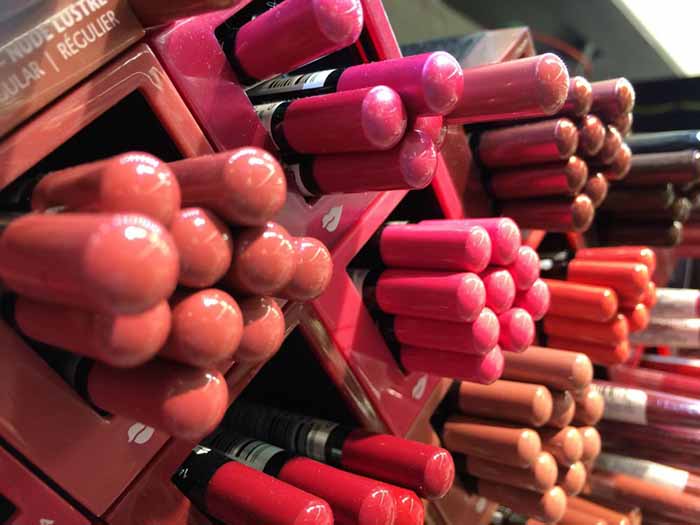
This one is not so simple. The scientific information that’s out there tells us that gluten cannot be absorbed through the skin so there is really no reason to avoid gluten in skin care products. But what about the possibility of ingesting gluten from say lip gloss, or lotions on your hands. After all, anything that gets on your skin has a way of getting in your mouth. Elisabeth Hasselback, formerly of The View, dedicated an entire chapter in her book, the G-Free Diet to her approach to gluten-free skin care which included the hair and make-up team at The View, ensuring they only used gluten-free products for her and never sharing her brushes.5
So should you avoid skin care products that contain gluten? Here's what the experts say...
 |
The Canadian Celiac Association tells us that you would have to eat a lot of lip gloss or toothpaste to have a gluten reaction. Check out this article if you’re interested in the details of the studies that were done, but the bottom line of this article is, there is no need to worry. |
 |
The Mayo Clinic however, contradicts this, stating that gluten in skin care products is only an issue if you swallow them and recommends that you avoid lipsticks, toothpaste and mouthwash that contain gluten.1 |
 |
The Celiac Disease Foundation, in the same article already referenced, recommends gluten-free skin care products in order to avoid getting gluten in open skin lesions, although I've found no reference to what happens if gluten does get into a skin lesion and none of the other sources I've referenced support this. |
Answer: It's a personal choice. Like so much in our celiac world, expert advice about gluten-free skin care is inconsistent and contradictory, so it really comes down to your comfort level and knowing your own body.
Gluten-Free Skin Care - 4 Simple Recommendations
1. Stick to your healthy naturally gluten-free diet. That is the best thing you can do for your skin.
2. If you have sensitive skin and react to certain products, check with a dermatologist or allergist and see what the issue is. You may be allergic to wheat, or to something completely unrelated, and it might be helpful to know what that is.
3. Get your thyroid checked. More on this below.
4. Do what makes you feel good, and calm and safe. If you just don’t like the idea of having gluten in your skin care products and you just prefer to avoid it, that’s okay.
Remember my food philosophy? I think this works for skin care as well.

Natural is best.
Balance is essential.
Simplicity is the thread that ties it all together.
That’s the approach I take. I put so much effort into avoiding gluten in my diet, to smear it on my skin or my lips just doesn’t make sense to me. It just kind of freaks me out, logical or not. I know the CCA says I’d have to eat my lipstick by the tube to get glutened, I don’t care. Gluten-free lip gloss is available so that’s what I’m going to get. I do take comfort though knowing that if I mess up, it’s not going to be a big deal.
Celiac Disease and Itchy Sensitive Skin
Dermatitis Herpetiformis
Although putting gluten on your skin, won’t cause a celiac reaction, consuming gluten definitely can affect your skin. The condition is called dermatitis herpetiformis or DH for short and it is essentially celiac disease of the skin.
As you may be aware, celiac disease can show up in our bodies in many different ways. Some people have IBS type symptoms like stomach pain, diarrhea etc., others have brain fog or achy joints. Some celiac sufferers have none of these and DH is the only manifestation of the disease. It was actually the first symptom I experienced and for years it was misdiagnosed as contact dermatitis.
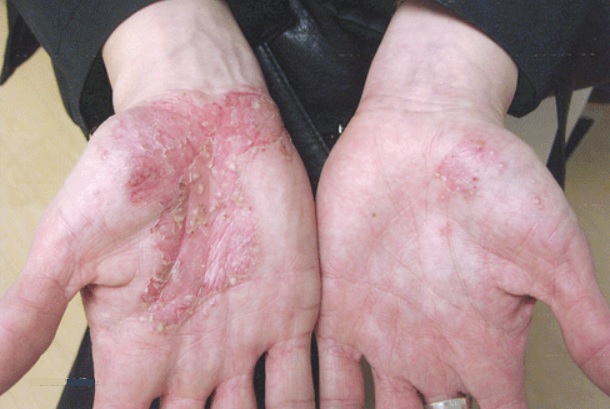
DH looks like tiny water filled blisters that may or may not have a little white head on them and they are EXTREMELY itchy, especially if the blister is broken. It tends to be bilaterally symmetrical meaning you’ll get it in the same place on both sides of the body. Maybe the inside of your elbows or the back of your knees. For me it was the palms of my hands. Flare ups were very uncomfortable not to mention embarrassing. I could see how cashiers looked at me when I handed money to them, and shaking hands was out of the question.
Dermatitis herpetiformis is a symptom of celiac disease and is sometimes the only symptom. It is caused by ingesting gluten, not by anything you put on your skin. The only cure is a gluten-free diet.
Other Causes of Itchy Sensitive Skin
Many people with celiac disease, myself included, report have very sensitive skin. For example they can't use scented products, products with sulphates, harsh cleaners, certain laundry detergents or hair-care products. The link, if there is one, is not well understood. People with celiac disease to tend to have other food intolerances and it's possible that people with dh may have other skin sensitivities. Autoimmune diseases tend to gang up and thyroid disease, which is an autoimmune condition can cause itchy sensitive skin, so you may want to get your thyroid checked.
Gluten-Free Diet and Skin Improvement
We've talked about dermatitis herpetiformis (dh), but what about the “normal” breakouts, the little annoyances that come along from day to day?
 Photo by noelle on Unsplash
Photo by noelle on UnsplashThere is nothing in the scientific literature to suggest gluten causes acne or other skin conditions, but you can find multiple testimonials from people who have removed gluten from their diets and saw improvement. Here is mine:
I've always had “sensitive” skin. For as long as I can remember I’ve been susceptible to little breakouts, even long past the age of, well maturity ;) I’ve read about acne in women over thirty and over forty and that it’s normal and it’s linked to hormone shifts. It’s true the breakouts would center more around “that time of the month”. I’d have little pimples popping up regularly, though nothing I couldn’t deal with and cover up with a bit of makeup. Then once a month I would get at least one whopper; a big sore lump under the skin that I couldn’t seem to do anything with but accept. I also had breakouts on my back and shoulders. Every so often I’d scratch without thinking and end up bleeding.
Any contact with household cleaners or soaps would have my hands breaking out in itchy blisters. Winter was a skin nightmare. No matter how much I’d moisturize, I’d always be tearing at my skin, the itchiness driving me nuts. Cortisone creams and itch creams would help, but you can only do that so much.
Since going gluten free, you’d think I’d traded in my old skin for an upgrade. My doctor even told me I was glowing. I rarely get a pimple. Even my monthly cycle became mostly skin problem free. If I do get a blemish it’s tiny and easy to take care of. I wear very little makeup these days. It’s just not necessary. The redness is gone from my skin. The pores and little veins have shrunk to being barely noticeable. No more breakouts on my back. I still get a little dry skin in the winter but it’s easily dealt with by moisturizing. I’ve gone to my cortisone tube once or twice this year when normally it would be several times a week. My skin even feels different. When I’d rub my face I used to be able to feel all the little bumps forming under the surface. Now it just feels smooth and soft.
I am still sensitive to scented products and harsh detergents so going gluten-free hasn't resolved all my skin problems, but it's certainly made them more manageable.
Gluten-Free Skin Care - Four Key Facts to Remember
 |
Gluten cannot be absorbed through your skin and you won't ingest enough gluten from skin care products including lip gloss or lipstick to have a reaction. |
 |
Dermatitis herpetiformis is a skin rash that some people with celiac get when they ingest gluten. It does not come from putting gluten on your skin. |
 |
Sticking to your naturally gluten-free diet is the best thing you can do for your skin. |
 |
To avoid gluten in your skin care products is a personal (and I think reasonable) choice. |
Gluten-Free Skin Care Products

If you
have Celiac, you need to make your own assessment of what you think is important and go by how you're affected. You may decide that what you put on your skin
is only important with regard to how likely it is to end up in your
mouth. As for me, I just prefer to keep gluten out of my life and that includes opting for gluten-free skin care.
Personal Recommendations
Just like with food, formulations change so always check labels and stay up to date with your favorite brands.
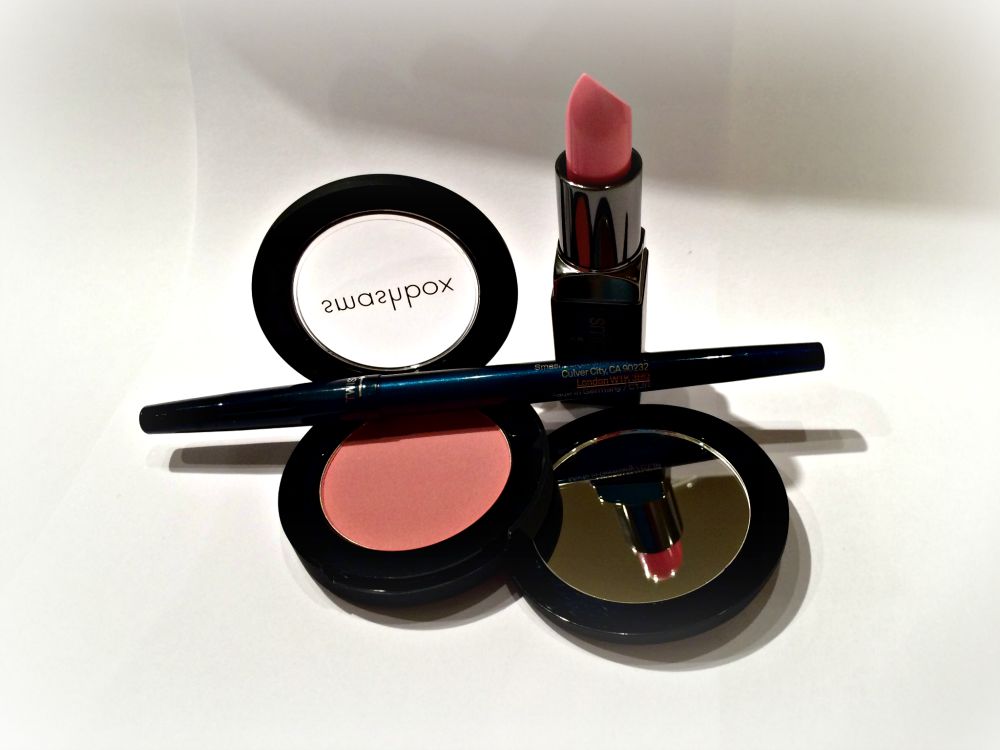
I’m very careful about lipstick and lip gloss. Whether or not you're concerned about gluten-free skin care, I think it makes sense to be careful about what you put on your lips. I threw out my old Revlon lip gloss because it contained gluten and I've started using Water Kiss lip gloss by Essence. Here are some other products I use.
Burt's Bees: Used to be a favorite because they used simple, natural, gluten-free ingredients. As the company has grown things have changed and not all products are as simple and not all are gluten-free. I still use their chapstick.
Mary Kay: I've looked into this brand and at time of writing, most of their stuff is gluten free. Check with the company on individual products.
Smashbox: Used to be entirely gluten-free but changed some of their lipstick formulations a few years ago to contain wheat germ. The company states that they will check for customers on a product by product basis if you email. I still use their foundation, eye shadow and eye liner but avoid their lipstick.
Yves Rocher’s sensitive line. I use their cleansers and moisturizer, I’ve emailed them and these products are gluten free.
Resources For You
Here are a couple of links I use regularly to check if skin care products are gluten-free:
Skin Safe tests for gluten as well as other common allergens: https://www.skinsafeproducts.com/search/products
VeryWell Health - 11 Makeup Brands That Offer Gluten-Free Options: https://www.verywellhealth.com/gluten-free-makeup-brands-562443
Skin Care Ingredients That Contain Gluten
Here's a list of ingredients commonly found in skin care products that may or do contain gluten:
Avena Sativa (Oat) Kernel Flour
Cyclodextrin
Dextrin
Dextrin Palmitate
Hydrolyzed Malt Extract
Hydrolyzed Oat Flour
Hydrolyzed Vegetable Protein
Hydrolyzed Wheat Flour
Hydrolyzed Wheat Gluten
Hydrolyzed Wheat Protein
Hydrolyzed Wheat Protein/PVP Crosspolymer
Hydrolyzed Wheat Starch
Maltodextrin
Secale Cereale (Rye) Seed Flour
Triticum Vulgare (Wheat) Germ Extract
Triticum Vulgare (Wheat) Germ Oil
Triticum Vulgare (Wheat) Gluten
Triticum Vulgare (Wheat) Starch
Wheat Amino Acids
Wheat Germ Glycerides
Wheat Germamidopropalkonium Chloride
Wheat Protein
Wheatgermamidopropyl Ethyldimonium Ethosulfate
Yeast Extract
If you’re wondering about the products you use, just email the company. Most will get back to you. If they don’t, that may be an indicator that you should switch.
Naturally Gluten-Free Skin Care

What about naturally gluten-free skin care? There is an argument for approaching what you put on your skin the same way you approach your food. Know where it comes from and what’s in it. The fewer ingredients the better.
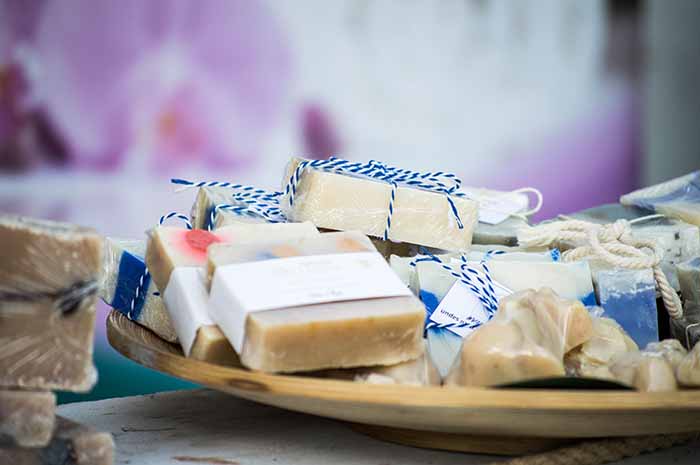
If you want to try out naturally gluten-free skin care products then here are some tips:
Buy Local: In the same way that I prefer to buy my food locally, if you check out farmers market and craft shows, you can usually find someone who makes their own soaps and skin care products. You can talk directly to them so you can find out what’s in them. Handmade soaps with coconut, olive and essential oils are wonderful and feel so good on your skin and you’re supporting the person who makes the product rather than the CFO of a multi-billion dollar corporation who really doesn’t need your money.
Check Out the Health Food Store: These are great spots for products that are free from allergens and unnecessary additives and they almost always have knowledgeable staff who can help you find what you're looking for.
Shop In Your Own Cupboard: You can find some of the best naturally gluten-free skin care products right in your pantry. Pure coconut oil makes a great moisturizer.

It can be a little greasy so a little goes a long way. Don’t just wipe it on, massage it into your skin, it feels wonderful. I like to massage a little into my face before bed, tie my hair back and fall asleep. When I wake up in the morning my skin is oh so soft. Several internet sources (and we all know that you can believe everything you read on the internet) say that coconut oil has anti-bacterial properties. I don’t know if this is true, but I do know that when my legs start to feel a little itchy in winter, slathering on some coconut oil and working it in to the skin works wonders.
My doctor also recommended olive oil. It's known to be very healthy in your diet, mono-unsaturates and all. I haven't tried it (on my skin that is) but I'm sure it works great.
You can find almond oil at the health food store or the bulk barn. It feels lovely on your skin after a shower. Seals in the moisture and makes your skin wonderfully soft.
All of this goes for men too. This natural stuff is all fragrance free; unless you choose one with a fragrance in which case you can pick something suitably manly and take care of your skin too.
A word about food in skin care products: There is some evidence that food products like goats milk or oats, when applied to inflamed skin can trigger allergies,6 Also, Elaine Gottschall in her book Breaking the Vicious Cycle refers to an increase in peanut allergies when peanut oil was added to baby lotions. My suggestion is; do your research so you can make an informed decision, avoid food based skin products on open sores and on babies.
Comments
Home > Gluten-Free Lifestyle > Gluten-Free Skin Care
Sources:
1. Kashyap, P. (2020, January 18). Celiac disease: Can gluten be absorbed through the skin? Mayo Clinic. Retrieved December 3, 2021, from https://www.mayoclinic.org/diseases-conditions/celiac-disease/expert-answers/celiac-disease/faq-20057879.
2. Canadian Celiac Association. (2021, October 21). Gluten and lotions. Canadian Celiac Association. Retrieved December 3, 2021, from https://www.celiac.ca/living-gluten-free/gluten-and-lotions/.
3. Geller, M. G., & Editorial@mediaplanet.com. (2016, May 20). 9 questions about celiac disease, answered, as featured in USA Today. Celiac Disease Foundation. Retrieved December 3, 2021, from https://celiac.org/about-the-foundation/featured-news/2016/05/9-questions-about-celiac-disease-answered/.
4. R., G. P. H., & Jones, R. (2020). In Celiac disease: A hidden epidemic (p. 149). essay, William Morrow, an imprint of HarperCollinsPublishers.
5. Hasselbeck, E. (2011). Gorgeously G-Free. In The G Free Diet: A gluten-free survival guide (pp. 171–180). essay, Center Street.
6Food in skincare products linked to development of allergies. Medical Xpress - medical research advances and health news. (n.d.). Retrieved December 4, 2021, from https://medicalxpress.com/news/2015-09-food-skincare-products-linked-allergies.html.
Home >Gluten-Free Lifestyle > Gluten-Free Skin Care











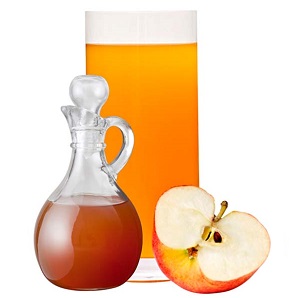
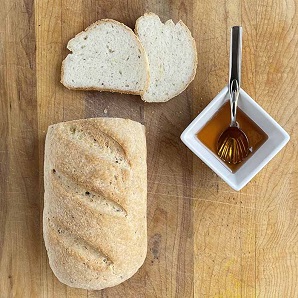
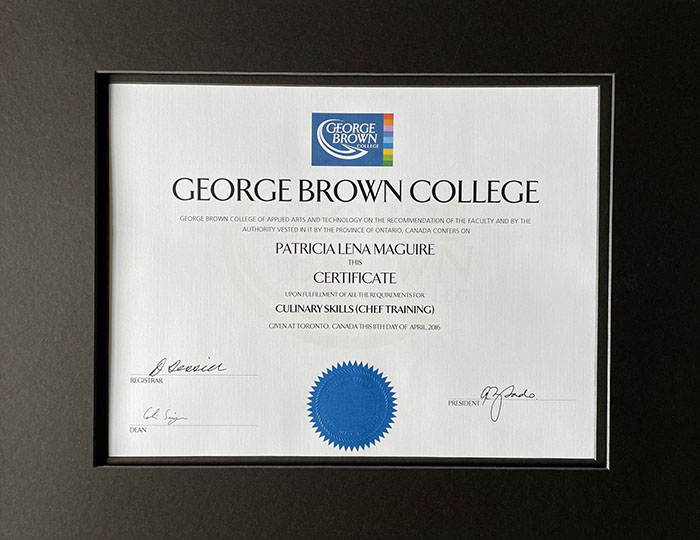
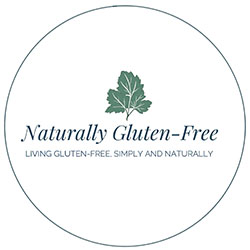
New! Comments
I'd love to hear from you! Leave me a comment in the box below.